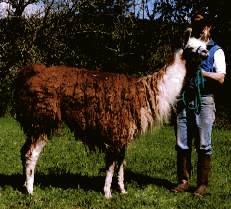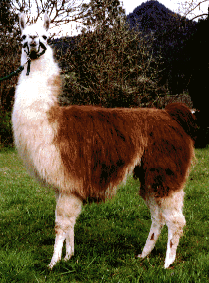Llama care, management and resources
- Llama FAQ
- Llama literature
- Basic care
- Castration
- Spaying
- About breeding llamas
- Handling young llamas
- Misdirected territorial aggression
- How old should llamas be for training and work?
Fiber from llamas
Llamas
as guardians
Classic performance llamas
Communicating
Our llama family
Just for fun
Cria photos
Training consultation
Performance
llama analysis
If you don't rescue ... DON'T BREED!
Lucky Ollie
Who knows where Ollie came from -- in any case, he ended up in the hands of people who intended to get rich with emus. Somehow, they also ended up with Ollie. When the unscrupulous, money-hungry owners (who were later convicted for drowning their children -- no kidding!) moved, Ollie and the emus temporarily stayed behind. The new house owners agreed to take Ollie in payment for taking care of the emus. But they hoped to sell Ollie and, funny thing, nobody seems to want untrained llamas in this area.
A year went by and Ollie's paddock was eaten down and grew only mud. He was provided hay and a tarp for shelter, but he had no other animals to keep him company. We were called to trim his toenails and deworm him. Upon our arrival, we found that one of the couples' parents would be taking Ollie that afternoon to live with his sheep. We pried Ollie's matted tail away from his matted legs and informed them that putting an intact male llama with sheep would likely result in dead and injured ewes. To make a long story short, Ollie was delivered to our house that day instead.
Ollie's coat was a disgusting, matted, felted, smelly mess. His incisors were badly overgrown, a combination of neglect and a genetic trait typically found in alpacas. And he had a full set of very sharp fighting teeth. We made a vet appointment right away.
After Ollie's castration, we turned him out into a small paddock with two other llamas. Ollie proved to be a scrapper, and it took nigh unto two months before screaming and slamming matches were the exception rather than the rule. This is a common problem with male llamas who have skipped the teenage stage of their llama socialization, and the only successful way to deal with it is to let them make up for lost time and learn that they really aren't unchallenged kings of the world.
Ollie's coat was in such bad condition that we had no choice but to shear, and shear we did -- as soon as the April showers seemed to warm up a bit. After some assessment, we found that Ollie had very little rehab to work through, although his prior training had some gaps in it. We discovered that he liked children, walks, and obstacles. The following spring, Ollie went to a small schooling show.
Ollie quickly caught on that performance classes can be a lot of fun. His happy demeanor attracted a lot of attention and one of the onlookers was considering getting a third llama. That summer, Ollie worked with his future owner and really became attached to her. The pair accompanied Waldo and Gwen to the Josephine County Fair, and Ollie even brought home a few ribbons. Soon afterwards, Ollie went to join his chosen human and her two llamas -- just a few miles down the road where we can see them as we drive to and from work.
Ollie enjoys his new home and pasturemates, and especially the extra attention. He also still likes the occasional visit from his friend Gwen, judging by the monster hugs he bestows on her. In June of 1997, Ollie competed in his first ALSA show at Redmond, OR, where he thoroughly enjoyed himself and also earned Reserve Champion Novice Performance Llama. Hooray for Ollie!


Lucky Ollie before . . . . . . . .................... . . and after ! ....................................
Return to Llama Rescue and Rehabilitation
Return to Lost Creek Llamas home page